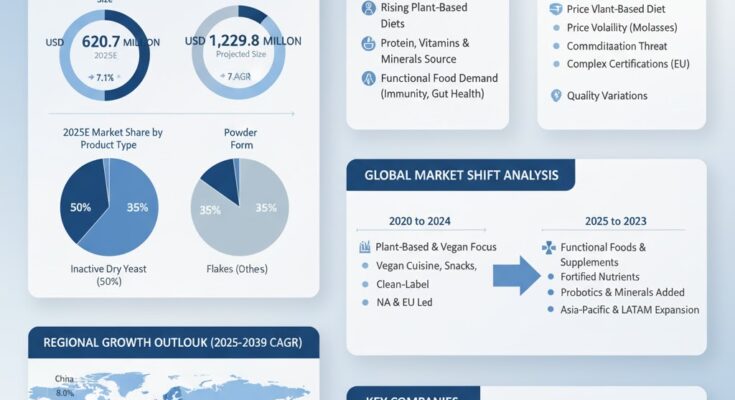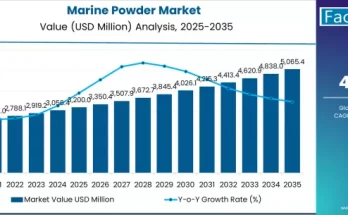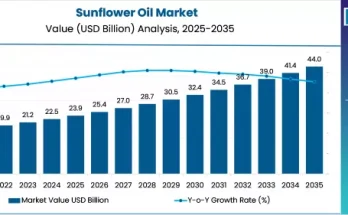The global nutritional yeast market is on a strong growth trajectory as consumer preferences increasingly shift toward plant-based diets, fortified foods, and functional ingredients. According to a recent report by Fact.MR, the market is valued at USD 620.7 million in 2025 and is projected to reach USD 1,229.8 million by 2035, registering a robust CAGR of 7.1% during the forecast period.
The market’s expansion is underpinned by the growing vegan population, heightened awareness of nutritional deficiencies, and rising demand for natural, protein-rich, and vitamin-enriched food alternatives. With consumers seeking clean-label products and fortified dietary supplements, manufacturers are focusing on innovation, sustainable sourcing, and diversified applications across the food, beverage, and animal nutrition industries.
Strategic Market Drivers
Rising Popularity of Plant-Based and Vegan Diets
Nutritional yeast has emerged as a go-to ingredient in vegan and vegetarian diets due to its savory umami flavor and high nutritional profile. Rich in protein, B-vitamins (particularly B12), and minerals, it serves as an ideal replacement for cheese and dairy flavorings in vegan food formulations. The rapid global shift toward ethical, sustainable eating habits continues to propel product adoption.
Functional and Fortified Food Demand
Consumers are increasingly drawn to foods that deliver health benefits beyond basic nutrition. Nutritional yeast is being incorporated into snacks, sauces, soups, and meal replacements for its immunity-boosting and energy-enhancing properties. Food manufacturers are fortifying yeast-based ingredients to enhance vitamin content and appeal to health-conscious demographics.
Innovation in Food and Beverage Formulations
Manufacturers are developing new product formats such as flavored nutritional yeast flakes, powders, and blends tailored for home cooking, retail, and industrial use. Functional beverages and dietary supplements enriched with yeast-derived nutrients are gaining traction, opening new growth avenues across both B2C and B2B channels.
Sustainability and Natural Ingredient Appeal
Produced through fermentation, nutritional yeast offers a sustainable protein source with low environmental impact. Its clean-label and non-GMO credentials make it an attractive ingredient for eco-conscious consumers, aligning with global sustainability goals in the food and beverage sector.
Regional Growth Highlights
North America: Market Leadership Through Innovation
North America dominates the global nutritional yeast market, driven by the rapid adoption of vegan diets and a strong presence of health food brands. The U.S. market benefits from increasing retail penetration of fortified yeast products and widespread consumer awareness of B-vitamin deficiencies among plant-based eaters.
Europe: Sustained Growth Through Functional Food Demand
Europe remains a significant hub, with high demand for organic, non-GMO, and clean-label yeast products. The United Kingdom, Germany, and France lead regional consumption due to rising interest in functional ingredients and regulatory support for fortified foods.
East Asia: Expanding Through Health-conscious Lifestyles
In East Asia, growing urbanization, changing dietary patterns, and rising disposable incomes are boosting demand for health-focused products. Japan, China, and South Korea are emerging as fast-growing markets, supported by strong retail distribution and government promotion of nutritional fortification.
Emerging Markets: Untapped Potential in Latin America and MEA
Latin America and the Middle East & Africa are witnessing increasing interest in fortified foods and dietary supplements. The expansion of health food retail networks and rising vegan population segments are expected to create new opportunities for yeast producers and suppliers.
Market Segmentation Insights
By Form
- Flakes: Dominating the market due to their versatile use in culinary applications and growing popularity as a seasoning and cheese substitute.
- Powder: Gaining traction in beverages, bakery products, and nutritional supplements for ease of blending and consistent nutrient distribution.
By Application
- Food & Beverage: Largest segment, fueled by demand for plant-based formulations in snacks, sauces, and meal kits.
- Dietary Supplements: Rising use of nutritional yeast in capsules, tablets, and powdered blends for its rich protein and vitamin content.
- Animal Feed: Increasing adoption in livestock and aquaculture feed for improving digestion and animal health.
By End User
- Retail Consumers: Growing awareness of plant-based and fortified food products drives direct-to-consumer sales.
- Industrial Users: Food processors and supplement manufacturers represent a significant share of global demand, leveraging yeast for product enhancement and nutrient fortification.
Challenges and Market Considerations
Despite promising growth, the nutritional yeast market faces a few challenges:
- Raw Material Price Volatility: Fluctuating costs of molasses and other fermentation substrates can affect production economics.
- Limited Awareness in Emerging Economies: Consumer education and marketing are required to expand adoption beyond developed markets.
- Taste Sensitivity: The unique flavor profile of nutritional yeast may limit its acceptance among non-vegan consumers unless masked or blended innovatively.
Competitive Landscape
The nutritional yeast market is moderately consolidated, with key players focusing on product diversification, global expansion, and technological advancements in fermentation and nutrient fortification. Prominent players include:
- AB Mauri
- Nutreco
- Archer Daniels Midland (ADM)
- Lesaffre Group
- Cargill Incorporated
- Associated British Foods (ABF)
- AB Vista
- Alltech
- Angel Yeast
- Oriental Yeast
- Caldic
Leading manufacturers are investing in sustainable yeast production, expanding application areas in dietary supplements and clean-label foods, and forming strategic partnerships with food and beverage companies to capitalize on evolving health and wellness trends.
Conclusion
As the global food industry pivots toward healthier, more sustainable, and ethical consumption patterns, the nutritional yeast market stands out as a key growth sector. Supported by innovation in product development and rising awareness of plant-based nutrition, the market is poised to achieve USD 1,229.8 million by 2035, solidifying its position as a cornerstone of the future functional food landscape.



